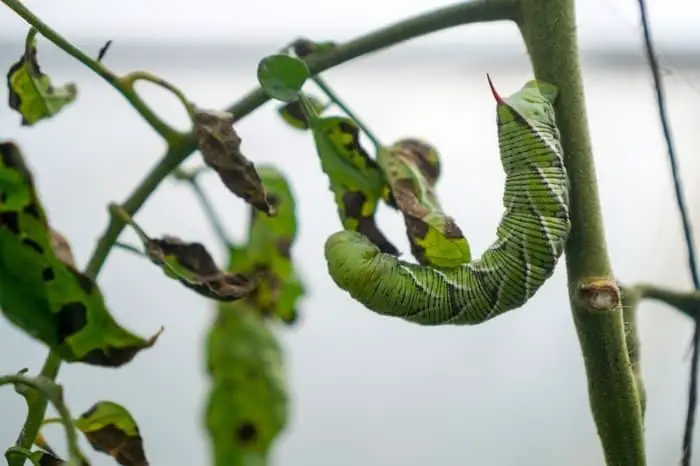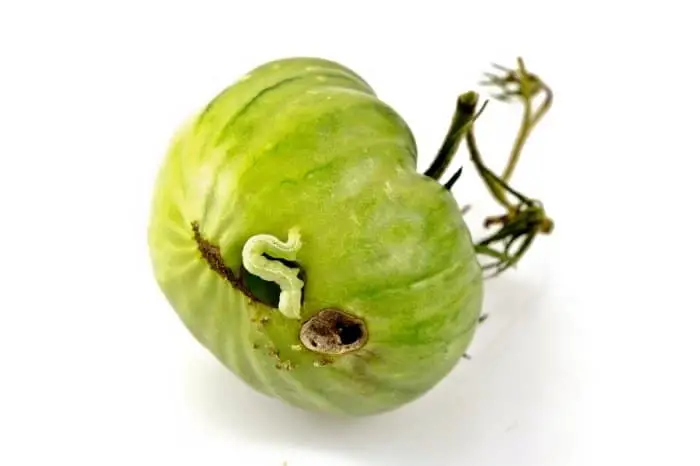Last Updated on March 16, 2023
Tomato worms are one common pest that bothers tomato plants and they can ruin your plants. They may look fierce and dangerous, but do tomato hornworms bite?
The huge green tomato worm can grow up to 4 or 5 inches long and they are one of the longest types of caterpillar. There is nothing more devastating than finding tomato worms in your garden feeding on your sweet tomato fruits.
The fact that the tomato worm has a stinger-like horn shape, some may be scared of them. So, if you’ve got tomato worms in your garden and you’re wondering if they bite then you should read on to know the answer to this. We will also discuss what you can do to get rid of these troubling worms.
What Are Tomato Worms?
Tomato worms, also known as hornworms are huge caterpillars that have a tail that looks like a horn. They love to chew on tomatoes, meaning tomato is their favorite food. They not only enjoy fruits, but they can also feed on plant leaves as well as their stems. These worms will eat plant leaves and can render your plant leafless.
Tomato worms will as well feast on other plant’s fruits such as eggplant, pepper, potato, and tobacco plants.
Do Tomato Hornworms Bite?
Even though these worms may look scary and savage, they are not stingers. Therefore tomato worms do not bite. They are harmless to humans and you can even pick them up off your plants anytime you sight them.
Where Do Tomato Worms Come From?
Tomato worms come from eggs laid by the adult moth. These moths are huge heavy-bodied insects that have narrow front wings. They are gray-brown and can have yellow spots on their abdomen.
Life cycle
The tomato worm life cycle begins as eggs are laid by the adult moths. These eggs are laid by the female after mating around summer and the eggs are laid on the host such as tomato, pepper, eggplant, etc. The eggs are oval and smooth with a light green color.
Next, the eggs hatch into caterpillars and the caterpillars are the worms that begin to feed and grow. The caterpillars can feed up until late summer or early fall.
Once they begin to feed and grow, in about 3 to 4 weeks, they become matured green caterpillars. This matured caterpillar will drop from the plants they are feeding into the soil and burrow into the soil. In the soil, they will change or transform into pupae. The pupae will stay in the soil and thrive through winter.
After surviving through winter, the pupae will emerge as adult moths during spring. Then the moths start another generation around mid-summer by depositing their eggs on their host plant.
Identifying Caterpillar on Tomato Plant
The tomato worm caterpillars may be hard to notice because they are green and can blend with your green plants. But once you notice any caterpillar of about 4 to 5 inches of green color and horn-like shape on your plant, then that’s a sign of tomato worm infestation. You need to act fast. If you delay any longer, they will continue to spread causing even bigger problems.
They are capable of devouring your plant leaves and causing serious damage a night. Once they grow bigger and older, they consume more and more. Those fully matured tomato caterpillars can consume a lot at that stage.
So, because of their green camouflaging color, you may not notice them on time. However, you should look closely and also look for droppings and follow the trail.
You can as well identify these worms with black lights. Once it gets dark, scrutinize your plant with the black lights. Tomato worms usually come out in the dark to feed and they will glow in the dark.
Let’s take a look at some control measures we can take to mitigate the situation.
Controlling Tomato Worms
There are various methods of getting rid of tomato worms and they include:
-
Handpicking
Tomato worms will not bite you so you can simply handpick them when you notice them in your garden. This process may take a while, but it’s totally worth it as you will be saving your plants.
After handpicking them, you can simply drop them in hot soapy water to kill them. You can as well feed them to your chicken or any birds if you raise them.
-
Spray the plant with soap and water
Another natural way to get rid of these worms is to spray them with liquid dish soap mixed with water. Spray your entire plant and worms until they are all covered. Doing this should eliminate them without causing any havoc to your plants.
-
Bacillus Thuringiensis (BT)
If the two natural methods we mentioned above don’t work, you can go for natural pesticides. It is safe to use on your plant and also safe for humans. Bacillus thuringiensis is a natural bacteria found in soil. The worm consumes these bacteria and its digestive system becomes paralyzed and it will eventually die.
Monterey LG6332 Bacillus Thuringiensis (B.t.) Worm & Caterpillar Killer
-
Beneficial insects
Beneficial insects can as well be used to control tomato worms. However, they can only work for a small population. Examples of these beneficial insects are ladybugs, lacewings, paper wasps, and so on. You can obtain these beneficial insects online or from your local garden stores.
-
Chemical insecticides
Chemical insecticides can be used to control these worms. However, they may not be safe for your organic garden. Notwithstanding, there are good options such as sevin insecticides which are non-systematic. This means they will not penetrate plant tissues and you can simply wash them off after their job is done.
Signs of Tomato Worms Infestation
When you begin to notice your plant leaves having holes or becoming wilted, then you need to have a close inspection of your plant.
You may also notice droppings of these worms on your tomato leaves or the ground. Also, if there are any green caterpillars around your plants, that may be a sign of tomato worm infestation.

Are Tomato Worms Poisonous?
Now that we know that tomato worms do not bite humans, you may be wondering if they are poisonous. You can safely touch tomato hornworms without being concerned about them biting, stinging, or being poisonous. However, you should never ingest these worms. If they are ingested, they may be toxic as tomatoes are part of the nightshade family and these worms remove the toxins from the plant. It’s important to seek medical advice if this happens.
What is the Best Tomato Worm Killer?
When killing tomato hornworms, it’s best to use a low-risk pesticide. There are many low-risk pesticides you can use. But some of my personal favorites are Spinosad, insecticidal soap, or Bacillus thuringiensis. Let’s take a closer look at all three.
- Spinosad. It’s derived from a natural microorganism. Can kill tomato hornworms through contact, or ingestion. However, ingestion is the most effective. You’ll notice the effects within one to two weeks. Be sure you keep a watchful eye on it until it’s dried, as it can be harmful to bees.
- Insecticidal soap. This doesn’t need to be ingested; contact is enough, but it must be direct. It’s effective against hornworms and what’s great about this is that it isn’t harmful to good insects.
- Bacillus Thuringiensis. A bacteria that derive from the soil. Contact is not enough for this pesticide, it must be consumed by the tomato hornworms. The younger the caterpillars, the more effective this method will be. This method is ideal if you’re looking to protect bees and insects.
Can a Tomato Hornworm Sting?
If you take a close look at the tomato hornworm, they are quite terrifying. They look as though they could be dangerous, but as well as not being poisonous, and not being able to bite, they also can not sting you. Apart from being harmful to your garden, they can’t cause any damage to humans whatsoever! They’re nowhere near as scary as they first appear.
Can Bearded Dragons Eat Hornworms?
Bearded dragons have a very versatile diet, and you may be wondering if you can feed them hornworms. And the answer is, absolutely. However, it’s best to buy the hornworms from a reputable store. Hornworms are used as food for many reptiles besides bearded dragons, such as geckos and chameleons.
Hornworms are easy for your bearded dragons to digest, as well as being a great source of calcium and hydration.
Are Tomato Hornworms Poisonous to Dogs?
We’ve mentioned that tomato hornworms can cause problems if ingested by humans, and the same can be said if ingested by your pets. Tomato hornworms can be poisonous to your dogs, so it’s important to seek veterinary advice if you think your dog has swallowed any.
Conclusion: Do Tomato Hornworms Bite?
Tomato worms may look fierce and dangerous but they do not bite humans. However, the damage they will do to your plants can be very serious. Ensure you monitor your plants closely, especially their favorite plants which are tomato, pepper, eggplants, and tobacco plants.
I hope this post has helped to answer the question: “do tomato hornworms bite?” and given you an idea of how to prevent and control them if you do manage to get an infestation. While they can be a nuisance to your garden, it’s a super easy problem to resolve. Do you have any tips and tricks when it comes to removing hornworms? If so, please feel free to let us know in the comments below. And remember, sharing is caring!
FAQs
Do hornworms bite humans?
Hornworms are not harmful to humans. However, they can cause damage to plants. The eggs and larvae are very destructive. They eat grass, soil, and roots. They can also kill plants.
A hornworm may bite if it feels threatened or cornered. They also may bite if they are hungry. If they are hungry, they may be trying to feed on the roots of a plant.
The most common cause of a hornworm bite is in the spring. The adults are out looking for food and the young ones are out looking for mates.
Are green hornworms poisonous?
Some people think that the green hornworm is poisonous because it tastes bad, and they won’t eat it. Others think that the green hornworm is poisonous because it has a very hard exoskeleton which doesn’t easily break down in the stomach.
But, they are not.
Where do tomato hornworms go during the day?
Tomato hornworm caterpillars are active during the day, and they may be feeding on leaves or other parts of plants. If you find a large number of them, try to see where they are hiding. Look for places where they might have access to foliage and leaves. You can also check under shrubs and trees for signs of feeding. Hornworms will leave a silken web on their food source. You can also look for frass, or insect droppings.
Tomato hornworms (Manduca sexta) are large, dark-colored caterpillars with a horn on their head and antennae. They feed on the leaves of tomatoes and other nightshade plants like eggplant and peppers. Hornworm larvae chew holes in plant leaves to feed on sap and then pupate. When they emerge as adults, they’ll feed on foliage until they reach maturity.
How do you prevent tomato worms?
Tomato worms are not a problem for everyone. I can’t say that I have ever had problems with them, but when I did, I didn’t know what to do about it. So I want to share some tips on how to get rid of tomato worms in your garden. Tomato Worms – What are they? A common pest for tomatoes, the tomato worm is a small insect, which can be up to 2 inches long.
They are most often seen in the garden when the temperatures are warm and humid. You may see them crawling around the base of plants, or laying eggs in the soil. How do you get rid of them? The best way to prevent tomato worm damage is to pick off any infested leaves, and destroy the eggs in the soil. Another good method is to grow plants in containers, so that you can take them out of the garden if they begin to appear. If you do need to control these pests, the easiest solution is to use a systemic pesticide. These products work by killing the pest from the roots down, which will help reduce any future problems. This is one of the best ways to prevent tomato worms, and many other plant pests.

Eunice is an enthusiastic gardener with a passion for growing beautiful flowers. She loves nothing more than spending time in her garden, tending to her plants and enjoying the outdoors. Eunice has been gardening for over 15 years and has developed a unique style of landscaping that is both practical and aesthetically pleasing. She is especially fond of growing roses and enjoys experimenting with different varieties and colors. Eunice takes great pride in her garden and often shares the fruits of her labor with friends and family. In her spare time, she enjoys reading gardening magazines and attending local horticulture events. Eunice is passionate about her hobby and is always eager to share her knowledge and experience with others.



